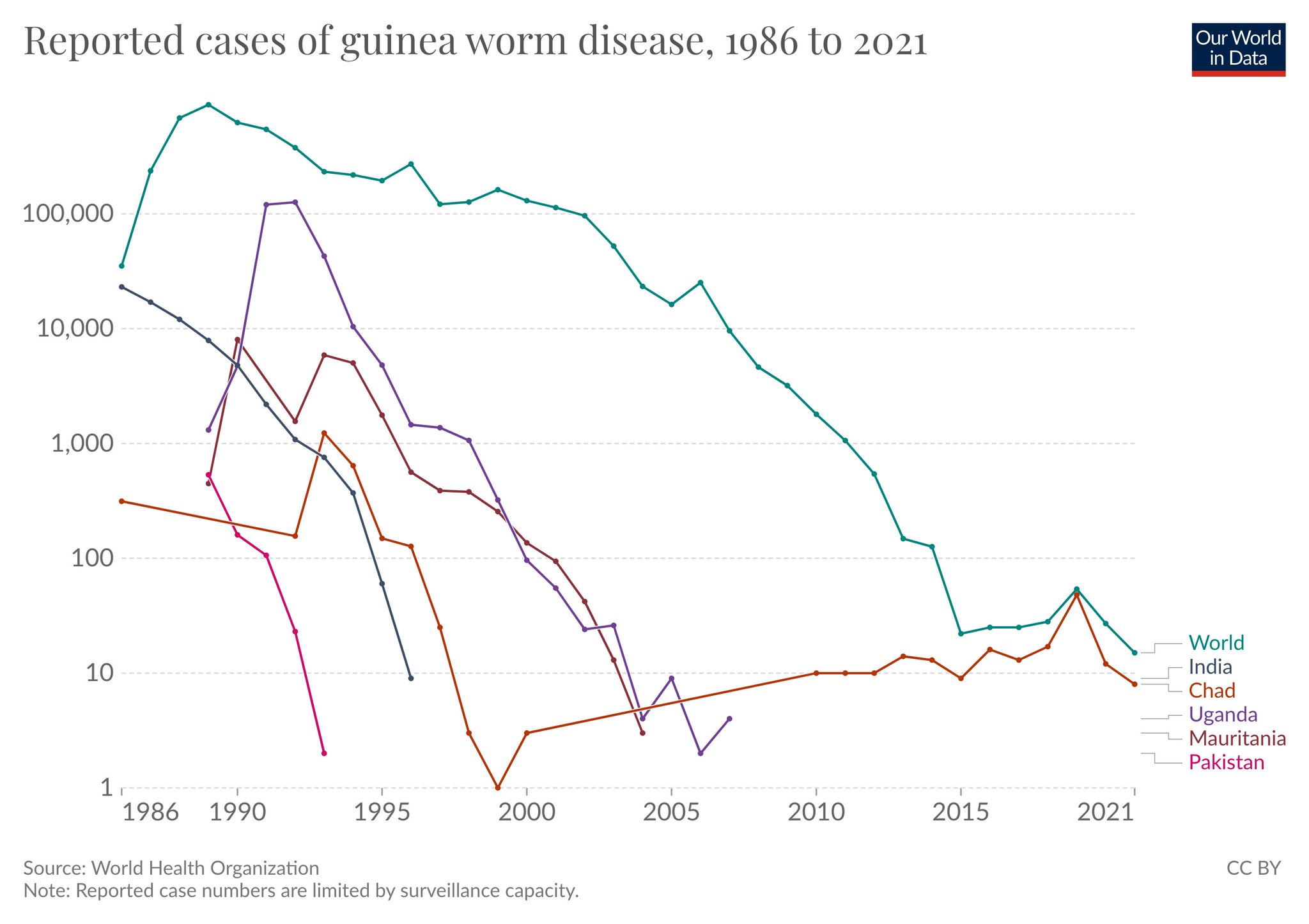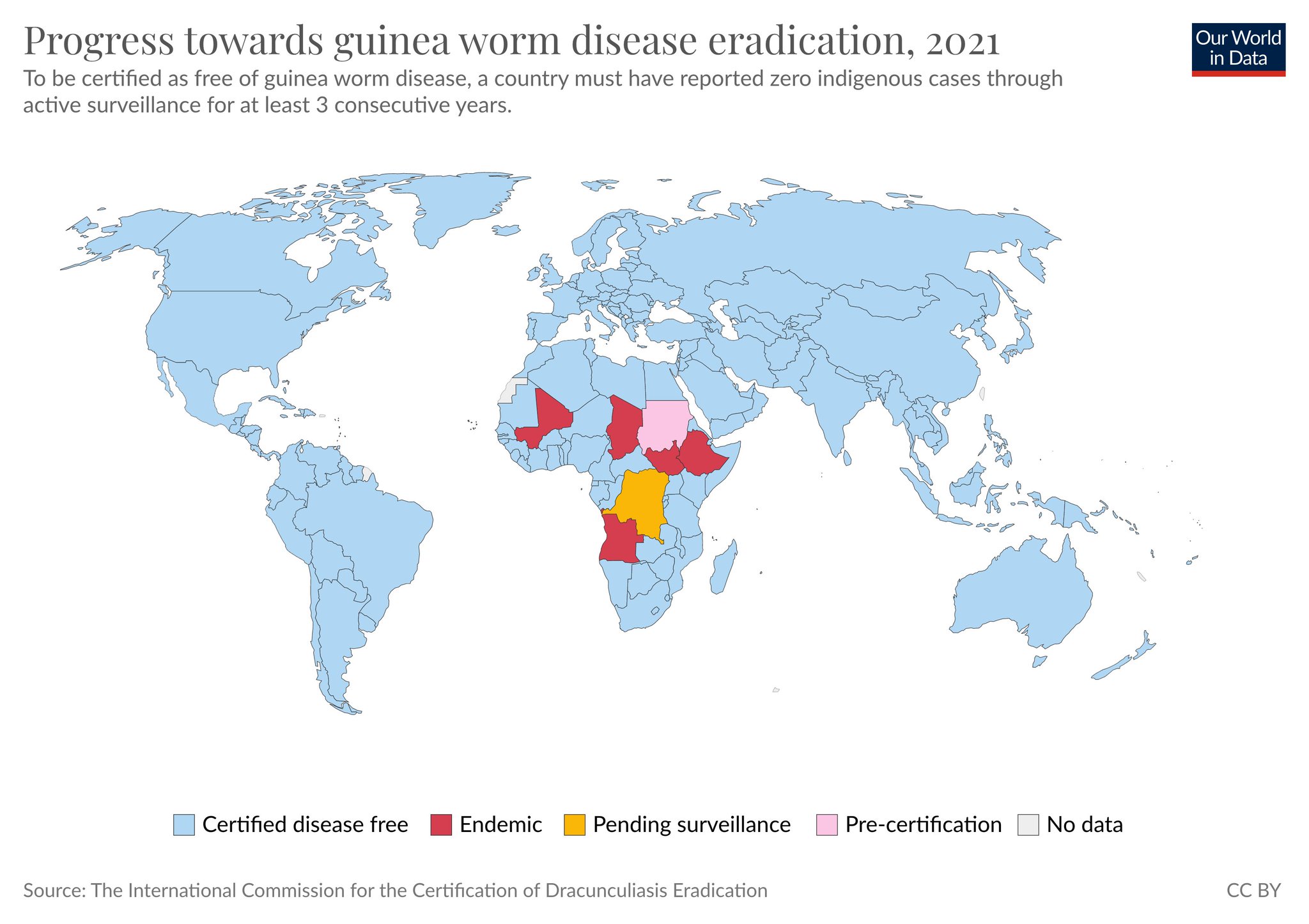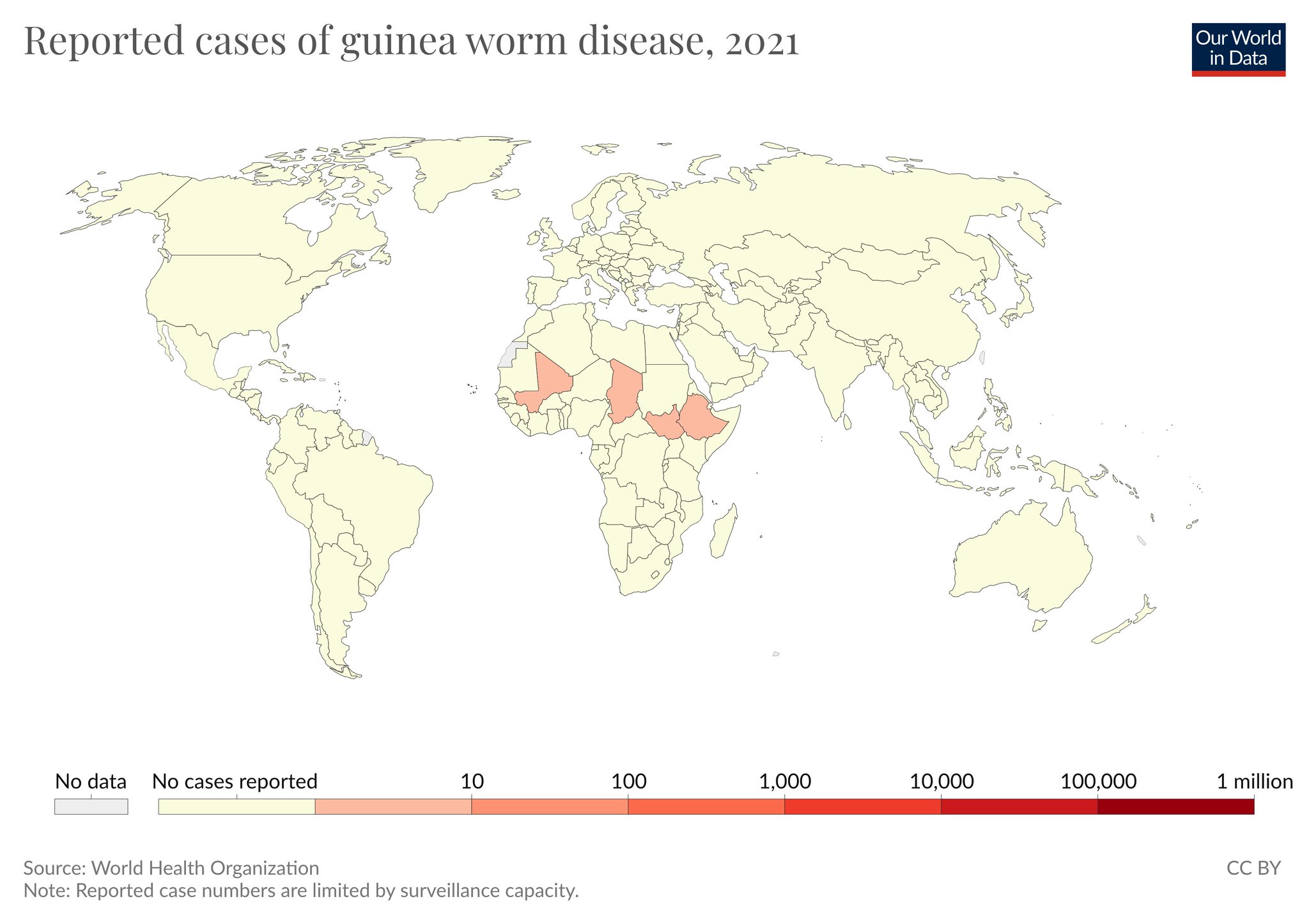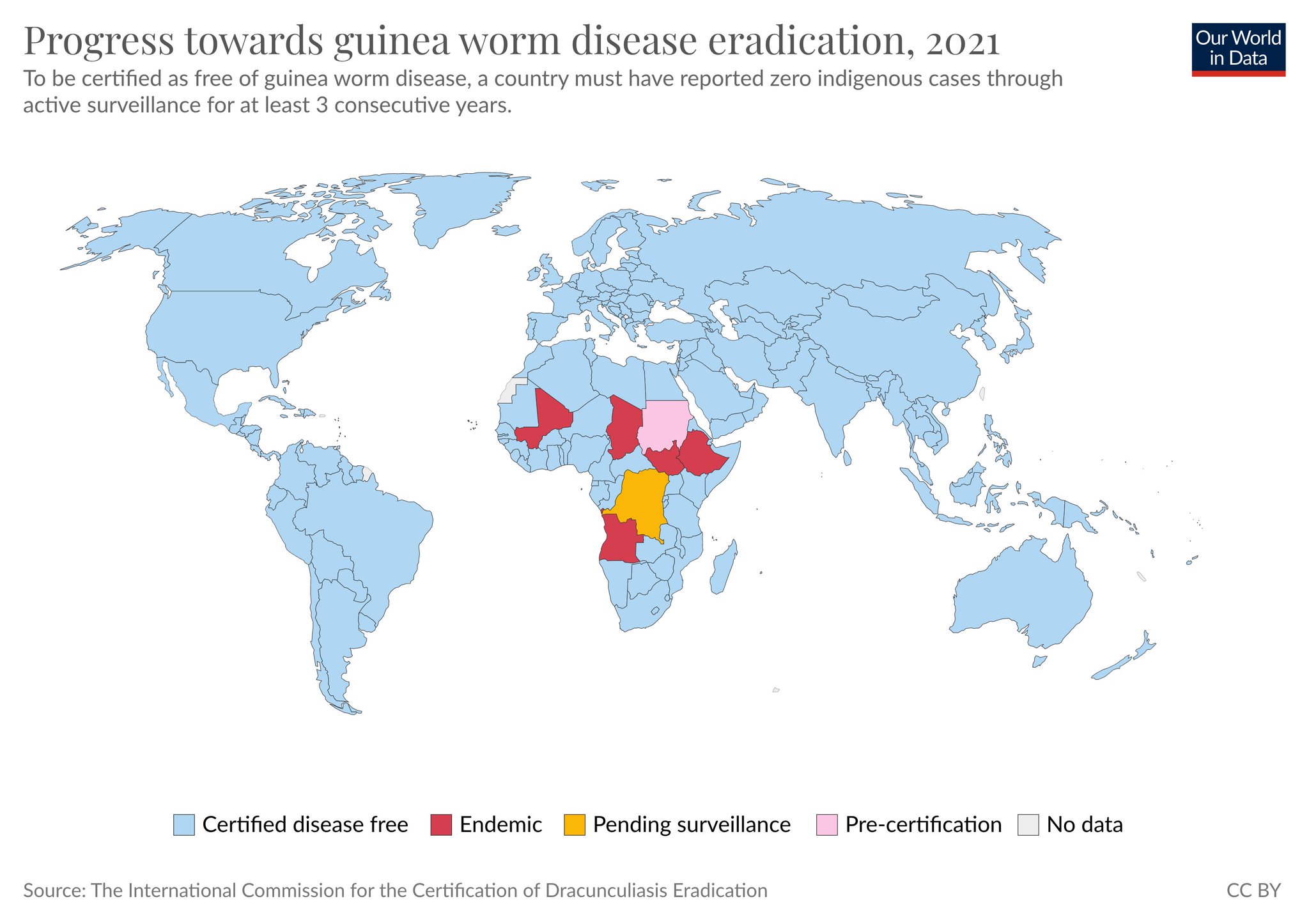Thread
Guinea worm disease is close to being eradicated worldwide!
Cases in 1989: >890,000
Cases in 2021: 15
In this new post for @OurWorldInData, we show how this progress was achieved and the remaining hurdles that need to be overcome. 🪱🪱🪱
ourworldindata.org/guinea-worm-path-eradication
Cases in 1989: >890,000
Cases in 2021: 15
In this new post for @OurWorldInData, we show how this progress was achieved and the remaining hurdles that need to be overcome. 🪱🪱🪱
ourworldindata.org/guinea-worm-path-eradication
🪱 What is guinea worm disease?
This is a debilitating disease caused by a parasitic worm called guinea worm.
In many countries, some water sources were contaminated by the worm’s larvae.
ourworldindata.org/grapher/number-of-reported-guinea-worm-dracunculiasis-cases?country=OWID_WRL~UGA~T...
This is a debilitating disease caused by a parasitic worm called guinea worm.
In many countries, some water sources were contaminated by the worm’s larvae.
ourworldindata.org/grapher/number-of-reported-guinea-worm-dracunculiasis-cases?country=OWID_WRL~UGA~T...
When people consumed contaminated water, the worm larvae could invade their stomachs and intestines.
It could slowly grow into a mature adult worm, reaching up to a meter in length!
It could slowly grow into a mature adult worm, reaching up to a meter in length!
This often leads to arthritic conditions and intense pain when the worm eventually emerges from the skin around a year later.
In some villages, people were infected repeatedly.
In some villages, people were infected repeatedly.
There are some treatments – mainly by removing the worm carefully as it emerges, and treating secondary infections with antibiotics.
But there are no vaccines against guinea worm disease.
So how has it been almost eradicated?
But there are no vaccines against guinea worm disease.
So how has it been almost eradicated?
The eradication campaign has made so much progress because we know how to reduce the transmission of disease:
By preventing people from consuming contaminated water.
By preventing people from consuming contaminated water.
There are many ways that this has been done.
• providing water filters
• treating water with larvicides to kill worm larvae
• educating people on where to drink water safely
• improving access to clean water sources
• providing water filters
• treating water with larvicides to kill worm larvae
• educating people on where to drink water safely
• improving access to clean water sources
With the expansion of clean drinking water and the efforts of the eradication campaign, cases of guinea worm disease have declined in many countries that were previously endemic.
ourworldindata.org/grapher/number-of-reported-guinea-worm-dracunculiasis-cases?tab=chart&country=OWID...
ourworldindata.org/grapher/number-of-reported-guinea-worm-dracunculiasis-cases?tab=chart&country=OWID...
Many countries have eliminated guinea worm disease entirely.
The worm's larvae can’t survive for long outside humans, so if its transmission is prevented, this can lead to total elimination.
ourworldindata.org/grapher/progress-towards-guinea-worm-disease-eradication?country=KOR~BRN~MDV
The worm's larvae can’t survive for long outside humans, so if its transmission is prevented, this can lead to total elimination.
ourworldindata.org/grapher/progress-towards-guinea-worm-disease-eradication?country=KOR~BRN~MDV
This progress was possible due to the eradication campaign, which began in the 1980s.
It was led by a number of organizations including the US CDC, the Carter Center, the WHO and UNICEF.
ourworldindata.org/grapher/progress-towards-guinea-worm-disease-eradication?time=2021&country=KOR~BRN...
It was led by a number of organizations including the US CDC, the Carter Center, the WHO and UNICEF.
ourworldindata.org/grapher/progress-towards-guinea-worm-disease-eradication?time=2021&country=KOR~BRN...
Now, with five countries endemic and 15 cases worldwide in 2021, we are close to global eradication.
But there are challenges that remain.
ourworldindata.org/grapher/number-of-reported-guinea-worm-dracunculiasis-cases?time=latest&country=OW...
But there are challenges that remain.
ourworldindata.org/grapher/number-of-reported-guinea-worm-dracunculiasis-cases?time=latest&country=OW...
🪱 1. There has been insufficient monitoring in the Democratic Republic of Congo to confirm the number of cases, or certify it as free of guinea worm disease if there are none.
ourworldindata.org/grapher/progress-towards-guinea-worm-disease-eradication?country=KOR~BRN~MDV
ourworldindata.org/grapher/progress-towards-guinea-worm-disease-eradication?country=KOR~BRN~MDV
🪱 2. It takes a year for the worm to emerge.
This means countries need to monitor for new cases for two more consecutive years after they have reported zero cases, in order to achieve certification.
This means countries need to monitor for new cases for two more consecutive years after they have reported zero cases, in order to achieve certification.
🪱 3. A few countries, such as Chad and Ethiopia, have recently had outbreaks linked to dogs infected with the worms, which had not been seen before.
This means extra efforts have been needed in recent years to prevent infections in dogs in those regions.
This means extra efforts have been needed in recent years to prevent infections in dogs in those regions.
🪱 4. It has been difficult to eliminate guinea worm disease in countries with violence and conflict, where healthcare workers are less able to treat and prevent infections.
Despite these challenges, there has been a massive decline in guinea worm cases over time.
The world is so close to the goal and with dedicated effort, we may soon achieve it.
After thousands of years, the entire world may soon be free of this debilitating disease.
The world is so close to the goal and with dedicated effort, we may soon achieve it.
After thousands of years, the entire world may soon be free of this debilitating disease.
Here is a link again to the whole post where you can find out more. 🪱🪱🪱
ourworldindata.org/guinea-worm-path-eradication
ourworldindata.org/guinea-worm-path-eradication
@f_spooner and I put together this post, with lots of helpful advice and comments from @_HannahRitchie and @MaxCRoser. 🥳
Thanks for reading!
Thanks for reading!
Mentions
See All
Michael Nielsen @michael_nielsen
·
Jul 8, 2022
Fantastic news and thread:





